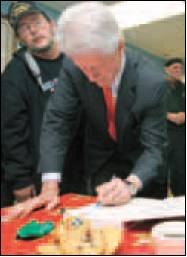No 10 told to publish Iraq cabinet minutes
http://www.independent.co.uk/news/uk/politics/no-10-told-to-publish-iraq-cabinet-minutes-787917.html
By Colin Brown, Deputy Political Editor
Wednesday, 27 February 2008
The information commissioner has ordered Downing Street to publish confidential records of two important cabinet meetings in the run-up to the Iraq war.
The Prime Minister's office signalled that it is likely to appeal against the unprecedented ruling by Richard Thomas, which could threaten a trial of strength between the commissioner and No 10. Downing Street now has a month to decide whether or not to publish.
Mr Thomas said publication should be allowed because of the "gravity and controversial nature of the subject matter" and to give the public a right to know how the decision to go to war was reached.
The ruling relates to a cabinet meeting on Thursday 13 March 2003, and a special meeting of the Cabinet held on 17 March 2003, on the same day that Robin Cook resigned as Leader of the House of Commons. The second meeting discussed the opinion given by the Attorney General, Lord Goldsmith, which held that the war was legal under international law.
The Cabinet Office had refused to publish the minutes, but was overruled by Mr Thomas, who challenged Mr Brown to accept the ruling as part of his pledge to give Parliament a vote before Britain went to war again. "Acceptance by the current prime minister that decisions to go to war should ultimately be referred to Parliament reinforce arguments flowing from the gravity of subject matter," he said.
"In this case, in respect of the public debate and controversy surrounding the decision to take military action in Iraq, the process by which the Government reached its decision adds to the public interest in maximum transparency."
He said he was prepared to exclude from disclosure some references in the minutes which could "have a detrimental effect on international relations". Clare Short, who resigned soon after the decision to go to war, kept a diary of both meetings and noted that Gordon Brown, then Chancellor, backed Tony Blair in attacking the French President, Jacques Chirac, for allegedly blocking a second UN resolution in support of military action. "GB spoke animatedly about what France was saying – no to everything. Jack Straw [then Foreign Secretary] also anti-France," she wrote.
Ms Short said yesterday: "The Attorney's full legal advice was never put to the Cabinet. We had virtually no discussion at all. We need a full public inquiry. After this decision there will be demands for more."
The Prime Minister's spokesman said the request would be properly considered but ministers had to "balance openness and transparency against considerations relating to the proper and effective functioning of government".
Wednesday, February 27, 2008
Downing Street ordered to publish minutes of 2 cabinet meeetings that led to Iraq War
Subscribe to:
Post Comments (Atom)

No comments:
Post a Comment